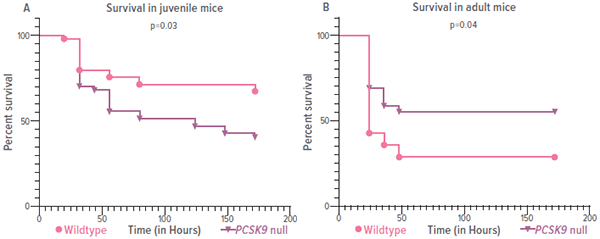PCSK9 Gene Plays Key Role in Poor Outcomes for Pediatric Septic Shock Patients
Published October 2020 | Critical Care Medicine
Septic shock—the most serious manifestation of sepsis, a severe response to an infection—causes organ failure and dangerously low blood pressure. Among critically ill children, septic shock is associated with major morbidity and mortality.
Despite decades of research, care for patients with septic shock remains limited primarily to antibiotics and intensive care. Biological heterogeneity and host developmental differences are key barriers to identifying the right treatment for the right patient.
In adults, loss of function in the proprotein convertase subtilisin/kexin type 9 (PCSK9) gene—a key lipid regulator—is associated with improved sepsis outcomes. As commercially available PCSK9 inhibitors are being tested for their efficacy against sepsis, researchers led by first author Mihir Atreya, MD, MPH, and senior author Hector Wong, MD, investigated the influence of the PCSK9 gene on pediatric septic shock outcomes.
In a large cohort of over 500 pediatric septic shock patients and in mouse models of sepsis, the team found that PCSK9 loss-of-function is associated with poor survival and increased organ dysfunction, contradicting the data for adults.
“Our data support the long-standing contention that developmental age is a crucial determinant of host response to sepsis,” says Atreya. “We found that the detrimental effects of PCSK9 loss-of-function in the pediatric host are not mediated by changes in serum lipoprotein concentrations, which have previously been positively correlated with sepsis survival in adults. Our data suggest that pleiotropic effects of PCSK9 may play a crucial role in the pediatric host response to sepsis.”
These results provide strong evidence to exclude pediatric sepsis patients from clinical trials of PCSK9 inhibitors. Further studies may enable the identification of mechanistic pathways and targeted sepsis therapeutics specific to children.
PCSK9 Gene Needed for Sepsis Survival

Loss of proprotein convertase subtilisin/kexin type 9 (PCSK9) shows opposite effects on survival between juvenile and adult mice with sepsis.





